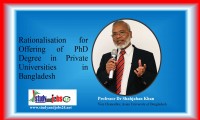
Unauthorised financial transaction has been one of the key catalysts in the recruitment of lecturers at eight public universities, leading to irregularities and corruption there, says a report of Transparency International Bangladesh.
Political leanings and nepotism are two of the dominant factors in the recruitment process at the 13 public universities surveyed, while regionalism and religious identity play a major role in appointment of lecturers in many of these institutions, it mentions.
The report titled “Recruitment of Lecturers in Public Universities: Governance Challenges and Ways Forward” was released yesterday.
It found allegations of unauthorised financial transactions in eight public universities.
The report, however, didn't name any of the 13 universities.
To secure the job of a lecturer, one had to make an unauthorised payment of Tk 3 lakh to 20 lakh. And in cases of such transactions through influential stakeholders, good academic results, political leanings, nepotism and regionalism didn't get importance, it says.
“This trend of financial transaction was observed more in the newly established universities compared to the old ones.”
Adherence or inclination to the ideology of the ruling political party always acted as an important catalyst in the recruitment of lecturers, it says.
Information on recruitment of lecturers from 2001 to November 2016 was considered for the research conducted between January and December this year.
Thirteen universities have been selected for the study. They include eight general universities, two science and technology universities, two engineering universities and an agricultural university.
“We can see reflection of the country's divided national political scenario here. We can see that the zero-sum game which is: you have to win or establish supremacy at any cost is vigorously accumulating here,” TIB Executive Director Iftekharuzzaman said at a press briefing at the TIB office in the capital.
The research also found some positive aspects such as some public universities maintained recruitment process based on merit and good academic records of the applicants, he said.
Some universities continue to follow this positive practice going against the tide. It can be a sign of hope and a good example for getting out of the malpractices, noted the TIB boss.
“However, the overall picture that we have found is frustrating and alarming.”
According to the report, the country's 37 public universities have 12,047 teachers, of whom 21.4 percent are female and 78.6 percent male. The number of lecturers is 2,830, and the teacher-student ratio is 1:19.
The report found no comprehensive rules for recruiting lecturers at the universities surveyed by the research team.
It pointed out that the vice-chancellors and pro-VCs have the scope to influence the recruitment process.
The TIB team found that irregularities in the recruitment of lecturers often start from the academic stage. Instances were found that teachers engineered or influenced academic results of some preferred students and subsequently helped their recruitment.
“There are instances where teachers divulged questions to preferred students before academic examinations and gave idea about possible questions in examinations in exchange of engaging students in their personal chores or matters.
“Again, there are examples of publishing academic results quickly to recruit a follower in the university, as well as delaying results for obstructing non-favoured candidates,” it says.
Different categories of internal and external stakeholders were found involved in the irregularities, including unauthorised financial transactions during recruitment of lecturers, the TIB report mentions.
Such stakeholders include a section of VCs, Pro-VCs, deans of faculties, departmental or institutional heads, teachers' association leaders and members loyal to the ruling party, staff at registrars' offices and student leaders, adds the report.
At the press briefing, Prof Syed Manzoorul Islam of Dhaka University said there is no scope for making compromises over such irregularities at public universities.
A brilliant student can be an asset for a university, while recruitment of an ordinary student as teacher can limit the institution's capacity to provide quality education, said Manzoorul, also a member of the TIB board of trustees.
The TIB report made some recommendations, including formulation of comprehensive policies or guidelines and rules for appointment of VCs and pro-VCs.
It says qualifications and rules for applying for the post of lecturer should be properly specified in advance, avoiding “preference given to candidates with special qualifications”.
Specific policies should be framed on constitution of recruitment committees at all universities while maximum publicity of recruitment notices should be ensured through major newspapers, it adds.
It further suggests that the role of teachers' associations should be limited to the academic agenda of universities.




